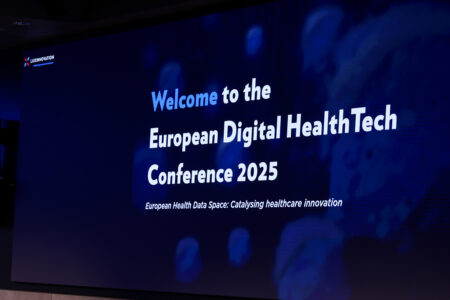 With nearly 450 million inhabitants covered by public health insurance, Europe represents an attractive market for healthtech companies. There is a growing demand for precision medicine, enabled by the exponential multiplication of health data, the development of new technologies and the progress of artificial intelligence.
With nearly 450 million inhabitants covered by public health insurance, Europe represents an attractive market for healthtech companies. There is a growing demand for precision medicine, enabled by the exponential multiplication of health data, the development of new technologies and the progress of artificial intelligence.
To facilitate and manage this evolution, the European Union is in the process of implementing the pioneering European Health Data Space (EHDS), which aims to establish a common framework for the use and exchange of electronic health data across the EU. On 25-26 March 2025, over 300 people from 35 countries gathered in Luxembourg to explore what this new regulation will mean in terms of opportunities for innovation and business. The event was organised by Luxinnovation, Luxembourg’s national innovation agency, in collaboration with Medical Valley and EIT Health.
European Health Data Space: Advancing AI in healthcare
The EHDS, which is expected to be fully operational by 2029, is designed to benefit researchers, industry players, patients, healthcare professionals, and policymakers. “This marks the beginning of a new era for healthcare in Europe where citizens can access their health data seamlessly across borders, where researchers and innovators can work with high-quality data governed by clear and secure rules, and where we unlock the full potential of digital health,” said Anne Calteux, who heads the representation of the European Commission in Luxembourg, speaking at the opening session of the event.
This marks the beginning of a new era for healthcare in Europe.
She pointed out that the EHDS holds significant potential for advancing AI in the healthcare sector in Europe. “By establishing common standards for health data, the EHDS will facilitate the aggregation of data from various sources across Europe,” she said. “Additionally, it will provide a secure and privacy-preserving framework for data sharing, allowing researchers and developers to access and analyse large volumes of health data while ensuring patient confidentiality. This will enable the development of AI models that learn from real-world data patterns.”
Facilitating digital health innovation
The EHDS will facilitate both the primary use of health data – directly benefiting individuals receiving care – and its secondary use for research and innovation. It will provide a framework for structuring data and making it interoperable, accessible and transferrable, also across borders. Speakers at the European Digital Healthtech Conference highlighted several advantages.
“For a startup like us, the EHDS will offer the opportunity to access datasets in a more cost-effective way to create proofs of concept or minimum viable products before spending large amounts of money,” said Arianna Arienzo, CEO and co-founder of VoiceMed, a Luxembourg startup focusing on vocal biomarkers. However, she pointed out that when the EHDS makes data generally available, competition between companies innovating in the same field will also increase.
Data is at the core of the pharma industry. We have high expectations of the EHDS as we think it will bring solutions to some of our challenges.
“Data is at the core of the pharma industry. We have high expectations of the EHDS as we think it will bring solutions to some of our challenges,” said Karen Crabbé, Economic and Health Data Advisor at pharma.be, the umbrella association of the innovative pharmaceutical industry in Belgium. She referred in particular to the metadata catalogues to be established, which will indicate existing databases and assign quality labels. The data governance to be implemented should also significantly reduce the time needed for researchers to get the permission to access and use health data.
The next four years of preparation will be crucial to ensuring the success of the EHDS initiative. “The legislation gives member states a lot of freedom, so there is still a risk that lack of harmonisation will block interoperability of data across different countries,” Ms Crabbé pointed out. “We have asked the Belgian government not to add any extra layers of complexity but to make the EHDS implementation as research friendly as possible.”
Supporting access to the European healthtech market
The efficient implementation of the EHDS ties in well with the Luxembourg government’s ambition to promote research on personalised medicine development. “Luxembourg has the skills, the vision and the determination to become a leading hub for digital health and personalised medicine,” emphasised Stéphanie Obertin, the Luxembourg Minister for Digitalisation and Minister for Research and Higher Education.
Our objective is to strengthen the competitiveness of our companies, and to contribute to the EU’s need for digital sovereignty.
In recent years, Luxembourg’s efforts and investments have focused on achieving infrastructure and data sovereignty, building an ecosystem based on trust and resilience, and connecting this national ecosystem to Europe and beyond. “Our objective is to strengthen the competitiveness of our companies, and to contribute to the EU’s need for digital sovereignty,” said Mario Grotz, CEO of Luxinnovation. “The common data spaces such as the EHDS are central to this ambition, and the lessons learnt from the EHDS implementation will be essential for the other fields that are to follow.”
He underlined that Luxinnovation’s aim is to stimulate digital health innovation and support the successful introduction of digital health solutions to the European market. “Luxembourg is a launch pad for business in the EU, and this ambition is close to our heart,” he said.
Photo credits: Luxinnovation/Sophie Margue
